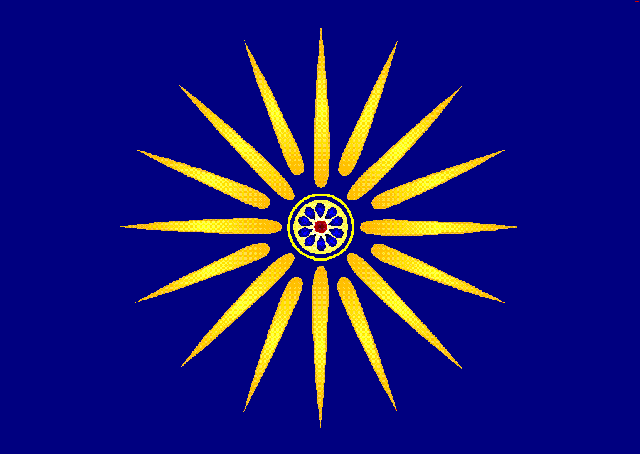My Greek DNA Beats Yours
6 Νοεμβρίου 2009
]Dear U of U: You don’t have to be born in Greece to be a Greek.
By John Saltas
A couple of years ago, I and other family members traced our DNA through FamilyTree.com. My DNA—so that of my father, his Greek father and so on—tested into Haplogroup R1a1, meaning our Y chromosomes have been wandering around central Europe since at least the time of the last Ice Age. My mother’s Cretan father (tested via a male cousin born to my mother’s brother) was shown to be a member of Haplogroup J2. That group is found throughout the ancient seafaring regions of the eastern Mediterranean. Landing there perhaps thanks to the Phoenicians, J2 is prevalent on the island of Crete, and it dates at least to the Minoan era.
That means distant male relatives of mine have been traipsing on or around the Greek homelands for thousands of years. During those millennia, the great power Macedon arose in what is now northern Greece and gave history two great leaders: Phillip II and his son, Alexander the Great, who conquered the world.
When he did so, he used some of those J2 DNA Cretans as archers in his army. Given the prevalence of R1a1 DNA throughout the Balkans, I can easily imagine that somebody in my bloodline helped Alexander ride into history. As such, I’m more than interested in the current tensions in that region between Greece and its neighbor to the north.
Macedonia is the northernmost Greek province, spreading vastly outward from the main port city of Thessaloniki. In recent decades, the southernmost republic of what was once called Yugoslavia— southern Serbia in fact—magically began calling itself Macedonia, too. The two Macedonias border each other. Imagine if someone decided to change the name of northern Mexico to Texas. Texans would be pissed. Well, Greeks are pissed.
Some very passionate—or crazy—scholars argue about who is the more rightful heir to the name Macedonia. It’s an important issue because the Republic of Macedonia (a name barely recognized even beyond Greece—maps refer to it as FYROM, the Former Yugoslav Republic of Macedonia) is seeking admission into the European Union. It’s a silly point. You can’t have two places of the same name bordering each other. Greece wins. They had it first and longest. Period.
The Greek region of Macedonia comprises over 75 percent of what was the former Macedonia, including the Macedonian cities of Pella, Vergina and Thessaloniki. The capital of FYROM is Skopje, which lies beyond the borders of ancient Macedon. That’s easily explained if you have lots of time, but basically, say thanks to Yugoslav leader Josip Tito (who promoted the name Macedonia in southern Serbia while aspiring to extend his domain through Greece to the warm port city of Thessaloniki); Communist insurgencies; plus Greek, Bulgarian, Serbian and Albanian conquests, among others.
If you think Mormons and non-Mormons fight a lot and say nasty things to one another, you need to check out what the people supporting FYROM are saying about the Greeks. And what the Greeks are saying back. Greeks living in the northern provinces suffered terribly during the civil war that followed World War II while rejecting their own Communist uprising that consumed countries to their north. Thousands were slaughtered by the Bulgarians who also have eyes on Macedonia. For Greeks, it’s not merely an ancient name they lay claim to but their very heritage—they would live in freedom or die fighting for it. Since they live on the best lands of ancient Macedon, they’ve been run over more than a BYU defensive back. Both sides fought dirty; both can point to atrocities by the other. You can easily discover if the Greeks were protecting their historic homelands or expanding their influence into the Tito’s cabbage patches.
The argument distills around whether ancient Macedonia was ever Greek—or, correctly, Hellenic—in the first place. If those arguing for FYROM claim they are the real ethnic heirs to Macedonia, then they should call up FamilyTree.com and find out. But given just-recent history with so many Albanians, Serbs and Bulgarians moving in and out of there, it would only prove that their slice of ancient Macedonia has new tenants. Hellenism is conceptual, not ethnic, and Greek is a language not an ethnicity. FYROM doesn’t get the concept, but it’s this: You don’t have to be born in Greece to be a Greek.
Alexander is a Greek name. So is Phillip. So is Thessaloniki. So is Bucephalus, the name given Alexander’s ox-headed horse (and, also, trivia nuts, the nickname of Hank “Bocephus” Williams Jr.). Macedon participated in the exclusively Greek ancient Olympic Games. Alexander was tutored by Aristotle, a Greek. Alexander and his Macedonian kingdom were Greek.
This week, the University of Utah is sponsoring the seventh Macedonian-North American Conference on Macedonian Studies—a scholarly attempt to commit national identity theft of the name Macedonia. There will be plenty of fingerpointing going on—if Greeks are allowed in to point back, that is. Each side will say they suffered more. Each will say the other is reshaping history. Each will count dead bodies, broken promises and acts of barbarism. And none of that will change the consequence of allowing two states or nations to share the same name—more trouble for that region.
University of Utah President Michael Young is right to allow such free expression on his campus. But Michael Young probably lacks either R1a1 or J2 DNA, too, so he may not understand why Greeks are riled at him. I suspect he’d feel differently if a long-lost cousin of his, maybe a Benjamin Young, started a new university in Orem, called it BYU and began claiming victimization while trashing Brigham Young himself. Yeah, he’s related, and Brigham likely did some awful things in his day, but that wouldn’t mean Michael might not want to wipe Benjamin’s snot off.




